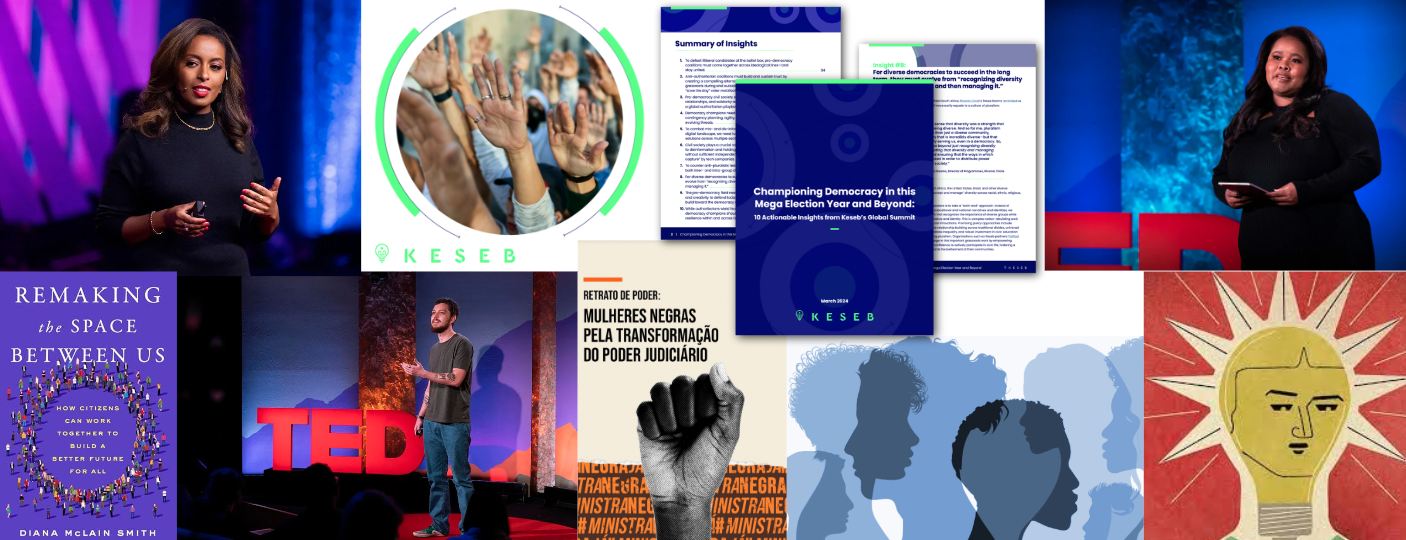
May 8, 2024
Two years ago, we launched Keseb with the dual mission of countering authoritarianism and advancing inclusive and resilient democracies.
Taking a multidisciplinary approach that draws practices from venture philanthropy, network building and think tanks, we currently run three impact initiatives. Our Fellowship initiative supports leading national democracy entrepreneurs and their organizations from three large, diverse and consolidated democracies: Brazil, South Africa, and the United States. Our Congenings initiative energizes the pro-democracy field by curating programming that facilitates transnational exchanges and amplifies innovative efforts. Our Intelligence initiative generates and disseminates actionable insights to equip practitioners, funders and policy architects.
Across these efforts, we are seeking not only to defend and strengthen the democracy of today but also to reimagine it to build towards a more pluralistic, inclusive, and resilient model for the 21st century.
To this end, along with our partners, we are working to cultivate a more positive and inspiring narrative for democracy that counters the illiberal and authoritarian conceptualization of our world. These narratives range from uplifting innovative solutions to making the case for why democracy, particularly inclusive democracy, is the best form of governance for human flourishing.
“With its inherent values of individual choice and collective voice, democracy is the most compelling vision we have for self-governance.” Keseb’s Yordanos Eyoel shares “how to reimagine, accelerate and protect the pro-democracy movement — to build societies that are both functional and inclusive.”
“Civil society has attended to social problems for decades while intentionally refraining from overt engagement with politics. But a new field of practice seeks to reinvigorate democracy by emancipating social innovation from this stricture.” The authors discuss three archetypes of organizations: “actors, orchestrators (such as Keseb), and enablers.”
“What does it mean to be an active citizen? It’s about more than just voting and paying taxes.” Keseb Democracy Fellow Gabriel Marmentini shares “why we can’t rely on the state alone to solve all our problems — and presents the four key ingredients for anyone to become a change-maker and engage in solving public issues.”
Engaging 650+ participants from 60+ countries, Keseb and the five Summit co-sponsors, united to create a space for transnational dialogue and knowledge exchange in preparation for the mega election year. The Summit focused on three themes: (1) Countering authoritarianism and safeguarding civil liberties; (2) Protecting our information ecosystems; and (3) Building towards a pluralistic democracy.
“South Africa transitioned to democracy in the 1990s with a visionary constitution, but the promises of that constitution are largely unfulfilled to this day.” Keseb Democracy Fellow Lindiwe Mazibuko “explores how poor leadership failed to deliver a better life for the country’s citizens — and shares her mission to cultivate a new generation of ethical leaders who can revitalize democracy in South Africa and beyond.”
The report provides a culmination of a multi-month analysis consisting of literature review and interviews with 75+ civil society leaders from Brazil, India, South Africa, the United States, and those working transnationally. These four former colonies – representing 25% of the world’s population – offer critical insights that can deepen our understanding of the crisis facing diverse democracies. Additionally, these countries surface immediate priorities for pro-democracy civil society intervention, particularly for practitioners and philanthropists.
Keseb Democracy Fellows Julian Walker and Tessa Dooms explore the question of what it means to identify as “Coloured” in South Africa and how this identification does not exist in isolation, but can (and often does) exist along other forms of identity, such as being Black. The dialogue extended to the historical formation of race, the nuanced aspects of social and political acceptance of identity, and how these concepts in South Africa can resonate with the experiences of Black Americans in the United States.
“Despite being the largest demographic group [Brazil] – more than 28% of the population, equivalent to around 60 million people – to this day [Black people] are not adequately represented at the top of the [Brazilian] Judiciary. The campaign, led by Keseb Democracy Fellowship organization Mulheres Negras Decidem, aims to highlight the achievements of a group of Black jurists who have a notable commitment to defending Human Rights and transforming [the]justice system.”
“Through emotionally affecting stories, Keseb Advisor Diana Smith recounts how tens of thousands of citizens across the U.S. are working together under the radar to bridge divides, heal [the] nation, and rebuild [American] democracy. Each story unearths the power [citizens] have to open the space within groups and close the distance across them.”
The discussion explores how women and young people have played a critical role in key recent elections in Argentina, Indonesia, and Poland. It surfaces key lessons and tactics to inform preparations for upcoming elections around the world.
As we deepen and expand our work to advance inclusive and resilient democracies, we kindly invite you to consider supporting our mission by making a tax deductible donation.
In solidarity,
Yordanos and the Keseb team
—
Keseb is a nonpartisan, nonprofit organization building an ecosystem for cross-country learning, collaboration, and innovation to counter authoritarianism and advance inclusive and resilient democracies.
Subscribe to receive updates from Keseb.
Share: